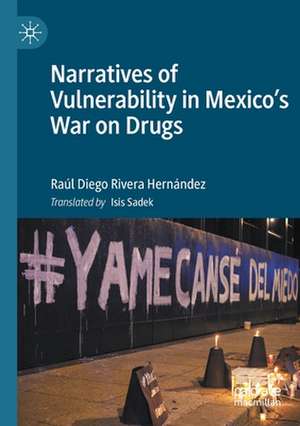Narratives of Vulnerability in Mexico's War on Drugs
Autor Raúl Diego Rivera Hernández Traducere de Isis Sadeken Limba Engleză Paperback – 14 aug 2021
| Toate formatele și edițiile | Preț | Express |
|---|---|---|
| Paperback (1) | 381.98 lei 6-8 săpt. | |
| Springer International Publishing – 14 aug 2021 | 381.98 lei 6-8 săpt. | |
| Hardback (1) | 388.13 lei 6-8 săpt. | |
| Springer International Publishing – 13 aug 2020 | 388.13 lei 6-8 săpt. |
Preț: 381.98 lei
Nou
Puncte Express: 573
Preț estimativ în valută:
73.10€ • 75.52$ • 60.81£
73.10€ • 75.52$ • 60.81£
Carte tipărită la comandă
Livrare economică 19 martie-02 aprilie
Preluare comenzi: 021 569.72.76
Specificații
ISBN-13: 9783030511463
ISBN-10: 3030511464
Pagini: 211
Ilustrații: X, 211 p. 9 illus., 8 illus. in color.
Dimensiuni: 148 x 210 mm
Greutate: 0.27 kg
Ediția:1st ed. 2020
Editura: Springer International Publishing
Colecția Palgrave Macmillan
Locul publicării:Cham, Switzerland
ISBN-10: 3030511464
Pagini: 211
Ilustrații: X, 211 p. 9 illus., 8 illus. in color.
Dimensiuni: 148 x 210 mm
Greutate: 0.27 kg
Ediția:1st ed. 2020
Editura: Springer International Publishing
Colecția Palgrave Macmillan
Locul publicării:Cham, Switzerland
Cuprins
1. Introduction.- 2. Vulnerabilities and Resistances in Transit: Narratives from Central American Colonial Transmigrants.- 3. “Nos están matando!”: Professional Reflexivity on Violence Against Mexican Journalists in Contemporary Chronicles.- 4. Dissident mourners: victims’ political participation in human rights activism.- 5. Conclusion.
Notă biografică
Raúl Diego Rivera Hernández is an Associate Professor at Villanova University. He has Edited Del Internet a las calles: #Yosoy132, una opción alternativa de hacer política (2016). His research chiefly focuses on cultural representations of the human rights crisis and the War on Drugs in Mexico.
Textul de pe ultima copertă
“This book provides an important and eloquent analysis of how cultural productions related to the War on Drugs reveal the ways the victimization of migrants in transit, journalists, and the relatives of disappeared ultimately give rise to crucial modes of politics and resistance. This is a topic that will be of great interest to anyone interested in the war on drugs, migration, democracy in Mexico, or indeed imperatives in general for human rights and social justice.”
--Shaylih Muehlmann, University of British Columbia, Canada
This book explores the current human rights crisis created by the War on Drugs in Mexico. It focuses on three vulnerable communities that have felt the impacts of this war firsthand: undocumented Central American migrants in transit to the United States; journalists who report on violence in highly dangerous regions; and the mourning relatives of victims of severe crimes, who take collective action by participating in human rights investigations and searching for their missing loved ones. Analyzing contemporary novels, journalistic chronicles, testimonial works, and documentaries, the book reveals the political potential of these communities’ vulnerability and victimization portrayed in these fictional and non-fictional representations. Violence against migrants, journalists, and activists reveals an array of human rights violations affecting the right to safe transit across borders, freedom of expression, the right to information, and the right to truth and justice.
Raúl Diego Rivera Hernández is an Associate Professor at Villanova University. He has Edited of Del Internet a las calles: #Yosoy132, una opción alternativa de hacer política (2016). His research chiefly focuses on cultural representations of the human rights crisis and the War on Drugs in Mexico.
--Shaylih Muehlmann, University of British Columbia, Canada
This book explores the current human rights crisis created by the War on Drugs in Mexico. It focuses on three vulnerable communities that have felt the impacts of this war firsthand: undocumented Central American migrants in transit to the United States; journalists who report on violence in highly dangerous regions; and the mourning relatives of victims of severe crimes, who take collective action by participating in human rights investigations and searching for their missing loved ones. Analyzing contemporary novels, journalistic chronicles, testimonial works, and documentaries, the book reveals the political potential of these communities’ vulnerability and victimization portrayed in these fictional and non-fictional representations. Violence against migrants, journalists, and activists reveals an array of human rights violations affecting the right to safe transit across borders, freedom of expression, the right to information, and the right to truth and justice.
Raúl Diego Rivera Hernández is an Associate Professor at Villanova University. He has Edited of Del Internet a las calles: #Yosoy132, una opción alternativa de hacer política (2016). His research chiefly focuses on cultural representations of the human rights crisis and the War on Drugs in Mexico.
Caracteristici
Winner of Best Book in the Humanities, LASA Mexico section Awards 2021 Focuses on literary and cultural artifacts related to the War on Drugs, examining how vulnerability is not a disadvantageous position, but a condition that can potentially lead to political resistance against state violence and criminal forces. Foregrounds victims’ points of view, offering a complex portrayal of the current political situation by denouncing the fusion of political and criminal violence as part of a “necro-political regime" Includes insights applicable to researchers, students, activists, human rights defenders, and NGOs alike
